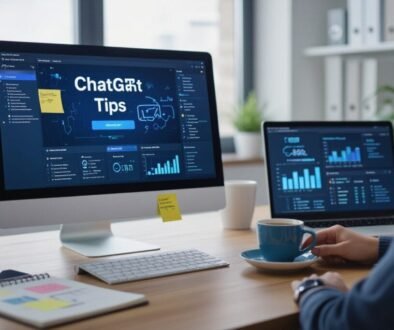Only 3 Jobs AI Can’t Replace (For Now)
Many people worry AI will take every job, but I, at Your Career Place, believe three roles are safer — for now. In this post I explain why developers, energy professionals and biologists still need human judgment, how you can protect your career, and what I and the team at Your Career Place recommend next.
Key Takeaways:
- AI is moving fast and shaking up the job market, but Bill Gates sees three roles still more resilient for now: software developers (people still needed for design, accountability and fixing AI), energy professionals (safety and infrastructure complexity), and biologists (creativity and hypothesis-driven work).
- Routine and entry-level jobs are most at risk — companies are already shrinking grad pipelines and cutting repetitive roles. At Your Career Place, we suggest focusing on skills that show judgment, systems thinking, and hands-on expertise to stay ahead.
- Timelines are uncertain — AI could change things quickly or more slowly. At Your Career Place, we’re watching the shifts and recommend planning for flexibility: deepen domain knowledge, build transferable skills, and be ready to pivot.

The Nature of Work and AI
At Your Career Place I watch how roles morph as automation scales: Goldman Sachs estimates AI could replace the equivalent of 300 million full-time jobs globally, and IBM already axed 8,000 HR roles. See lists like These are the 40 jobs most at risk of being replaced by AI … for specifics, and ask yourself which parts of your day are routine versus judgment-driven.
Understanding AI Capabilities
I separate AI strengths into pattern recognition, scale and consistency: generative models such as GPT-4, Claude and Gemini can summarize thousands of documents, draft code and handle customer queries, yet they still stumble on accountability and novel problem framing. Bill Gates tests systems multiple times daily and finds answers eerily comprehensive, so at Your Career Place I tell you to build skills that lean on judgment, context and cross-domain thinking.
Jobs Most Susceptible to Automation
Telesales, data entry, routine admin and low-level coding are already being automated; Amazon warned teams will shrink and hiring patterns are shifting. Microsoft and Goldman Sachs highlight clerical, repetitive white-collar tasks as highest risk, and a 2025 McKinsey survey found 42% of Gen Z grads feel AI has reduced their prospects. I advise you to map which daily tasks match those patterns and start moving toward roles where human oversight and relationships matter.
I see concrete examples: banks replacing tellers with kiosks, law firms using AI for e-discovery so junior associates log fewer billable hours, and warehouses automating pick-and-pack. Dario Amodei predicts half of entry-level white-collar jobs could vanish within five years, echoing broader estimates. If your work is rule-based—form filling, standard replies or repetitive code fixes—it’s vulnerable. Your Career Place recommends re-skilling into problem framing, client-facing work and interdisciplinary roles that AI can’t reliably own yet.
Creativity and Human Intuition
I see AI speeding up idea generation—GPT-4 or Midjourney can draft concepts in seconds—but real creative value still hinges on human context, cultural reading and risky bets; I watch teams use AI to produce 80% of rough material, then spend weeks shaping voice, moral nuance and audience fit. For a useful take on which roles AI may not touch soon, see No Doctors, No Chefs: Bill Gates Lists the Only 3 Jobs AI …, a point I bring up often at Your Career Place.
The Role of Emotion in Creativity
I rely on emotion to steer creative choices: empathy, irony and discomfort are tools AI struggles to deploy reliably. In my experience running workshops at Your Career Place, human-led tests reveal subtle tonal shifts—audience laughter, pauses, tears—that machines miss, and those reactions directly shape final scripts, product copy and brand storytelling in ways algorithms can’t predict.
Jobs that Thrive on Human Creativity
Roles that fuse deep domain knowledge with original expression—UX strategists, brand storytellers, lead designers, film directors and senior R&D scientists—remain resistant to full automation because they require judgment, political savvy and ethical trade-offs I help candidates highlight at Your Career Place.
Digging deeper, I advise clients to sharpen skills AI complements: narrative framing, cross-disciplinary synthesis and live facilitation. For example, a senior UX strategist I coached translated AI-generated prototypes into a coherent roadmap that increased stakeholder buy-in; that human translation—negotiating trade-offs, reading org politics and choosing which risks to take—keeps the job human and valuable.

Ethics and Decision-Making
Complex Moral Judgements
I watch AI handle massive data fast, yet moral trade-offs — like choosing between two patients in scarce-resource scenarios — demand human values and accountability. The 2018 autonomous-vehicle fatality involving an Uber test car and the 2016 ProPublica analysis of COMPAS bias show algorithms can produce harm without a moral agent to answer for it. At Your Career Place I tell you that judges, clinicians and commanders still need to interpret context, precedent and human pain in ways models simply can’t justify.
Professions Requiring Ethical Considerations
Doctors, judges, social workers, biosecurity researchers and military officers routinely face decisions where legal, moral and social consequences collide; triage protocols during COVID-19 and bioethics debates over gene editing are concrete examples. I advise you, via Your Career Place, to focus on roles where licensure, peer review and public accountability matter—those safeguards keep human judgment central even as AI offers diagnostic or analytical support.
Deeper training and institutional checks help explain why these jobs persist: physicians often invest roughly a decade in medical school and residency, judges typically bring 10–20 years of legal practice, and licensed clinical social workers log 2,000–4,000 supervised hours in many states. I point to these numbers to show that ethical expertise is formalized—boards, codes and appeals processes give you a place to challenge algorithmic decisions rather than accept them blindly.
Interpersonal Relationships and Care
Human touch, trust and shared history create value AI can’t mimic; I see this daily at Your Career Place when candidates choose careers for meaning over efficiency. Goldman Sachs estimates AI could displace the equivalent of 300 million full‑time jobs, yet roles in childcare, eldercare and family counseling depend on sustained empathy, nonverbal cues and relationship memory that models struggle to sustain.
The Importance of Human Connection
I’ve watched clients select therapists and nurses not for speed but for continuity: a 2025 McKinsey survey found 42% of Gen Z grads feel AI already narrowed job prospects, so your ability to build trust is marketable. Therapists reading facial microexpressions, nurses recalling personal histories, and social workers mediating family dynamics create outcomes AI can’t reliably reproduce.
Careers in Healthcare and Counseling
I tell people at Your Career Place that registered nurses, licensed counselors and geriatric care specialists remain in demand because clinical judgment, crisis de‑escalation and longitudinal care require human presence. AI speeds charting and suggests diagnoses, but I still hire for empathy, cultural competence and the legal accountability that comes with licensure.
Look at day‑to‑day tasks: I want clinicians who can break bad news, navigate family conflicts, and make ethical calls when protocols clash—situations where nuance matters. Upskilling matters too; certifications like NP, LCSW or specialty gerontology roles protect your career while AI handles routine vitals, triage checklists and documentation.
Final Words
Ultimately I see only three jobs—coders, energy specialists, and biologists—holding out for now, and at Your Career Place I urge you to treat this as a planning moment, not panic. I track shifts like Bill Gates on AI: Humans won’t be needed ‘for most things’ and advise you to focus your skills where human judgment still matters. Your Career Place is here to help you pivot with confidence.
Thank you for visiting Your Career Place. Here are some more articles for your review.
https://yourcareerplace.com/why-ai-won-t-replace-human-coaches/
https://yourcareerplace.com/business-ethics/
https://yourcareerplace.com/7-stable-ai-proof-jobs-for-introverts/




